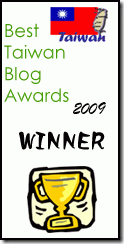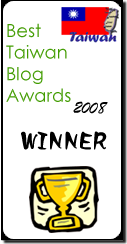Hsieh vs. Ma: A virtual presidential debate
Reason vs. mere rhetoric
In the post I wrote yesterday marking the 20th anniversary of the end of martial law in Taiwan, I quoted DPP presidential candidate Frank Hsieh (謝長廷) explaining that forgiveness of the Chinese Nationalist Party's (KMT) past offenses against Taiwan (which -- be honest -- continue to this very day) shouldn't include giving them another chance to be Taiwan's stewards. Here's the quote once more:
"We can forgive a 'caretaker' who harmed our people, raped our daughters and stole our property, but we can never allow him to be the caretaker again."The quote is back in the news today, having started a debate of sorts (in which the participants were in different locations at different times). Reporters who had heard tell of each quote then asked the relevant candidate's opponent for his response. Or something along those lines.
Hong Kong-born KMT candidate Ma "There's-a-seriously-decomposed-
The article -- in which Ma wishes people would just forget all about martial law in Taiwan -- relates it like this:
Ma slammed Hsieh for his remarks, saying he "was surprised to hear Hsieh speak ill of others, because Hsieh is religious."Speaking truth to authoritarianism (whether one is religious, agnostic, or atheist) doesn't count as "speak[ing] ill of others" (造口業) -- a phrase which implies unjust criticism. In the case of Hsieh's description of the KMT, it's simply truth that must be told because of the vast media conspiracy that would prefer for the public to ignore the dark past (and present) and focus on such hollow words (如空話) as "handsome" instead. Hey, Ma "Informed-on-
Ma also challenged Hsieh's idea of "reconciliation and coexistence," calling it "hollow words."
But the KMT's double-standard-bearer (Ma) didn't stop there. Continuing to avoid logic at all costs, he actually buttressed the validity of Hsieh's criticism with this next bit:
"The fact that the KMT was bad in the past doesn't prove the DPP is good now," Ma said.First things first: "[T]he KMT was bad," and that's a fact, Jack!
But just in case your head is spinning from Ma's non sequitur, let's break down the "logic":
The fact that noun A was adjective B in the past doesn't prove that the opposite of noun A is the opposite of adjective B now.Replacing those with some words chosen off the top of my head, I come up with this: "The fact that the dog was furry in the past doesn't prove that the cat is hairless now." Or, "The fact that Hitler was evil in the past doesn't prove that [choose your own contemporary opposite] is benevolent now."
As you can see, the statement is utter nonsense.
Ma "Foolishness-doesn't-prove-anything" Ying-jeou, therefore, can't even prove his own assertion (that the DPP is not good) -- but he does bolster my assumption above that the DPP -- despite all its faults -- is pretty much the polar opposite of the KMT. No wonder he never passed the bar exam.
The beleaguered former Taipei mayor (Ma) stumbles onward while gazing at himself in the rearview mirror:
"The KMT has stepped down [following the 2000 presidential election] and has reflected on its conduct during the martial law period," he said.They love to claim that they "reflect" (反省) -- in a genteel and inscrutable Confucian manner -- on the errors of their murderous ways, but we still have Ma "Singapore-is-a-good-model-to-follow" Ying-jeou spewing nonsense. If any such "reflection" had actually occurred, the die-hard KMT members would have returned their stolen assets to the people of Taiwan, donated whatever was left to the victims of the "228 Massacre" and subsequent White Terror, and perhaps even gone home to the "motherland" to be with the ones they love. Whatever! Hsieh says to stay here and enjoy the democracy earned on the backs of the Taiwanese if you want -- just don't expect the people who call Taiwan their motherland to want you to be their president.
Hsieh puts the final nail in the conversation with this alliterative verse:
Hsieh said the victims [of political persecution during the martial law era] should forgive their persectors but never forget.I can't wait to see these two go head-to-head in a real debate on live television.
"Those who forget history will be forgotten by history. Those who abandon history will be abandoned by history," Hsieh said.
"Those who have harmed others are in no position to ask their victims to forget."
FURTHER READING: For Hanzi versions of what was said by the two candidates, try here, here, here, here, or here.
Pros and cons: Taiwan, 台灣, Republic of China, 中華民國, DPP, 民進黨, KMT, 國民黨, Frank Hsieh, 謝長廷, Ma Ying-jeou, 馬英九, democracy, 民主, 228 Massacre, 二二八大屠殺, freedom, 自由, martial law, 戒嚴, Taidu, 台獨, White Terror, 白色恐怖
Cross-posted at It's Not Democracy, It's A Conspiracy!
Labels: democracy, DPP, Frank Hsieh, KMT, Ma Ying-jeou, martial law, Taidu, Tim Maddog, White Terror, 台獨, 國民黨, 戒嚴, 民主, 民進黨, 白色恐怖, 謝長廷, 馬英九
















3 Comments:
http://chinadigitaltimes.net/2007/07/is_frank_hsieh_a_moderate_david_g_brown.php
Is Frank Hsieh a moderate? I thought this is interesting view point since it implies he is indeed a radical. but in the article Hsieh wants anything BUT an independent Taiwan. Odd, huh?
Anonymous, I'm not sure you're really trying to understand that article. I'll have to take a closer look at author David G. Brown's previous pieces to see what else he has written about the subject.
What I do see in my initial read, however, is Brown defining Hsieh as a "moderate" only within an implied definition of the DPP as "radical." That kind of thing sets my BS detector a-buzzing.
Your semi-capitalized "anything BUT" gets my BS detector buzzing even more. Here's what Brown actually wrote. [added emphasis is mine]:
- - -
One person who worked with him, in the 1990s said he was then open to options for Taiwan’s future other than formal independence.
- - -
"One [unnamed] person" said it. The "then" implies this could be a position he no longer holds. The "open" bit doesn't exclude support of independence. And the word "formal" implies that Taiwan need only be recognized as independent, as it already operates independently from China, and that may be his definition of the "status quo."
There's a whole lot that Brown's article ignores -- the redshirt demonstrations that had taken place in the run-up to the Taipei mayoral election, for example. He thus removes very important context for broad statements made within.
Tim Maddog
I disagree that 造口業 implies unjust criticism, as the phrase is religious (in particular Buddhist). I cite:
http://www.ctworld.org/meditation/02_a11.htm
口業方面,不僅守口如瓶,不妄語、不兩舌、不綺語、不惡口,進而能以誠實語、和諍語、質直語、柔軟語,待人接物,規過勸善,即獲口業清淨。
And 惡口 includes "vicious" or "malicious" speech, which, even if TRUE or JUST, is still a thing the Buddha suggested avoiding.
Though you could argue it does 和諍.
So Ma's point is arguable if not correct on a Buddhist level, even if it's stupid on other lines of reasoning.
Post a Comment
<< Home